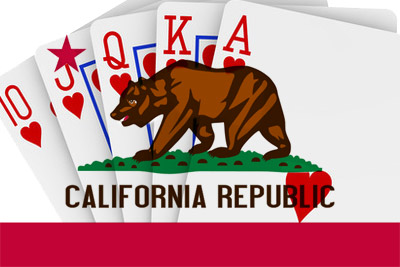It's hard to fathom that Nevada and New Jersey have already started offering online poker while California is really not even close. After the passage of the UIGEA which legalized intrastate online wagering, California was expected to be the first state to offer online poker as a logical extension of its numerous land based poker rooms but unfortunately infighting between the land based poker rooms, the racetracks and the various Indian tribes has resulted in a stalemate which has precluded online poker from going forward. California politicians at both the state and federal level have tried to introduce bills along the way to get the ball rolling but it has proved to be a futile effort. The biggest sticking point by far and away have been the tribes which scuttled all efforts to offer online poker in the early stages but they finally agreed to allow online poker to move forward once they were assured that they would have exclusivity to all non-poker online gambling and they were allowed to compete for online poker licenses as well. But that's where the consensus ended. The last few years has seen the tribes arguing about what the rules should be put in place for online poker who they should be allowed to partner with.
The first major breakthrough in the stalemate occurred last year when Senator Lou Correa worked with the tribes and came up with a poker bill it seemed most could live with. Under that bill, titled the Internet Poker Consumer Protection Act of 2014, all betting had to take place in California, owners and employees had to reside in California and all bank accounts had to be kept in the state. The bill also had the usual rules relating to age verification, geo  verification (to ensure they were indeed gambling in California), problem gambling and taxes. But most importantly for the tribes there was a special tribal exception which allowed each to set up their own regulatory regime which they deemed crucial so that any tribe that already had a land based poker room or casino didn't have to go through a separate approval process to offer online gambling. The bill also had a bad actor clause that excluded any site which catered to the U.S. market after October 2006 from obtaining a license and surprisingly that has been the biggest sticking point. The Morongo Tribe had set up a partnership with PokerStars (before the purchase by Amaya) and the bad actor clause would have cancelled that agreement. The Morongo Tribe refused to sign any bill that had a bad actor clause while 13 other tribes banded together to ensure the bad actor clause was kept in and PokerStars was kept out. Since then one of those 13 tribes (The San Marino tribe) also partnered with PokerStars so they no longer want the bad actor clause kept either. The bill was an urgency statute but failed to get the 2/3 vote necessary likely because of the disagreement over the bad actor clause.
verification (to ensure they were indeed gambling in California), problem gambling and taxes. But most importantly for the tribes there was a special tribal exception which allowed each to set up their own regulatory regime which they deemed crucial so that any tribe that already had a land based poker room or casino didn't have to go through a separate approval process to offer online gambling. The bill also had a bad actor clause that excluded any site which catered to the U.S. market after October 2006 from obtaining a license and surprisingly that has been the biggest sticking point. The Morongo Tribe had set up a partnership with PokerStars (before the purchase by Amaya) and the bad actor clause would have cancelled that agreement. The Morongo Tribe refused to sign any bill that had a bad actor clause while 13 other tribes banded together to ensure the bad actor clause was kept in and PokerStars was kept out. Since then one of those 13 tribes (The San Marino tribe) also partnered with PokerStars so they no longer want the bad actor clause kept either. The bill was an urgency statute but failed to get the 2/3 vote necessary likely because of the disagreement over the bad actor clause.
So with 2015 around the corner, in true Hollywood fashion the politicians (specifically Assemblyman Mike Gatto) has snapped the slate and yelled "poker bill take 5" this time with the introduction of poker bill AB 9 the Internet Poker Consumer Protection Act of 2015. The bill is actually very similar to last year's but there are a few additions. The bad actor clause has been kept but this time it excludes anyone connected with a site and also its affiliates. Specifically the bill excludes "any person, site, or covered asset that knowingly engaged in unlawful Internet gambling after Dec. 31, 2006." The bill also requires residents to set up accounts at physical land based poker rooms or tribal casinos and the first deposit has to be made in person. Plus the bill opens up the door to interstate online poker wagering in the future.
The sticking point for this bill will no doubt be the same as the one last year which of course is the bad actor clause. The wording still excludes PokerStars despite its recent purchase by Amaya Gaming and the Morongo tribe has clearly stated they will not agree to it. Strangely this interpretation of what constitutes a bad actor goes against the opinion of New Jersey legislators which have always contended that a bad actor is a person not an entity. The new definition of a bad actor could also exclude the Pala Band of Mission Indians from receiving a license since again the wording excludes any covered asset including employees and directors and Jim Ryan was on the payroll of Excapsa, the parent company of UltimateBet in 2007 and Ultimate Bet was accepting American accounts at that point in time. This of course would contradict the New Jersey Division of Gaming Enforcement which ruled that Jim Ryan was not a bad actor and which allowed Pala Gaming to be the first native group to get a New Jersey online poker license. The wording could also exclude NETeller which continued to process gambling transactions for Americans in January 2007 despite the fact that NETeller has been given a clean bill of health from both New Jersey and Nevada.
So in essence, AB 9 is a step backwards in achieving universal consensus among the tribes but that may not necessarily be Gatto's objective. As an urgency bill AB 9 requires 2/3 approval to pass and an industry analyst I spoke to indicated that Gatto is going to push hard to get all the tribes and other interested parties to unite against the Morongo tribe and Pala Band of Mission Indians to convince 2/3 of the Assembly to pass the bill. It seems that California politicians have just come to the realization that unanimity is impossible so they are willing to take the majority approval and since most of the bands are in favor of excluding bad actors since they want to run their own poker rooms without any partnerships. At this point the state is just losing too much money by not having online poker and they feel that they have to move forward at any cost. No doubt Amaya will be screaming blue murder if this bill is passed since they paid almost $5 billion to purchase PokerStars with the assumption they would get a California license. In fact that license was one of the biggest incentives to buying the company.
The one party that seems to have been ignored in all the new bills is the racing association. Once an active part of the negotiations the racetracks aren't mentioned at all. It appears that either the politicians told them that online poker doesn't affect the racing industry or more likely they have been promised a cut of the money that the state takes in through taxes and as such have just silently consented to the new rules.
So will AB 9 get approved in the New Year? Considering the size and influence of the Morongo tribe, PokerStars and NETeller my hunch is that lobbying will take place to ensure that it does not get the 2/3 approval and at this point next year we'll be discussing The Internet Consumer Protection Act of 2016.
Read insights from Hartley Henderson every week here at OSGA and check out Hartley's RUMOR MILL!






































